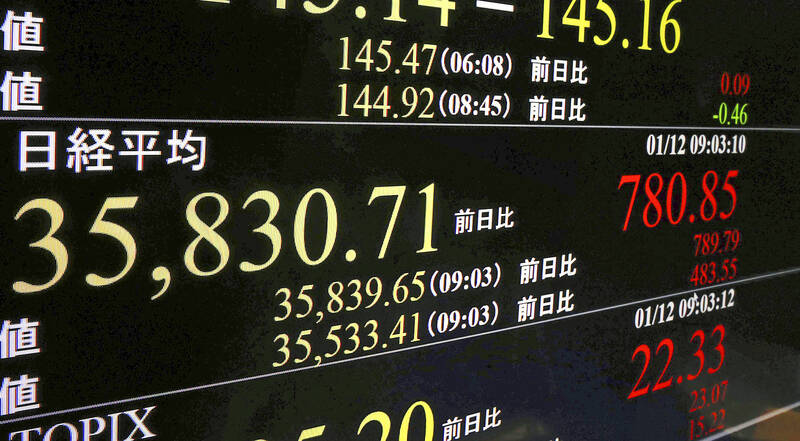Japanese equities extended their rally into the new year, with the Nikkei 225 Stock Average completing the biggest weekly gain since March 2022.
The blue-chip gauge rose 1.5 percent yesterday, buoyed by the yen’s weakening since the start of the year and upbeat expectations for the nation’s shares. It ended with a weekly advance of more than 6 percent.
The TOPIX benchmark, which has a wider variety of companies, climbed for a seventh trading session, during which all of its 33 sub-indices have advanced. The strength in Japan has taken both key indices to 34-year highs this week amid inflows from foreign investors, a favorable exchange rate and investor optimism that decades-long deflation is coming to an end.

Photo: Kyodo News via AP
Adding to the market’s momentum, Chinese investors are flocking to Japanese exchange-traded funds, with turnover in one fund rising to a record high on Wednesday. The introduction of revamped tax-free accounts this year is also playing a major role in the rally for Japanese equities.
“Large-cap stocks, high-dividend stocks, and growth stocks with foreign demand are likely to continue to attract buying due to overseas investors’ buying and from tax-exempt savings accounts,” Mizuho Securities Co market strategist Nobuhiko Kuramochi said.
A strong start to this year on the back of Japan’s outperformance of other major markets last year points to a big shift in the investment environment for the world’s third-largest economy, Nikko Asset Management Co said.
Tensions between the US and China should continue to increase attention on Japanese equities this year, Goldman Sachs Group Inc said.
Both the Nikkei 225 and TOPIX completed an annual advance of more than 25 percent last year — their best performance in a decade.
While the all-country index is popular with tax-exempt retirement savings accounts known as NISA, Japanese companies that have high dividends are also attracting demand, Asset Management One chief strategist Takeru Ogihara said.
“There is a possibility that investors will buy in the first half of the year before March, or move a little ahead of schedule,” he added.
Electric appliances and exporting companies were the largest contributors to the TOPIX yesterday as the yen headed for a second weekly loss on the receding view that the Bank of Japan would end its negative interest rate this month.
Fast Retailing Co led gains in the Nikkei 225, jumping to a record high after the Uniqlo owner’s first-quarter operating profit beat the average analyst estimate.

Semiconductor shares in China surged yesterday after Reuters reported the US had ordered chipmaking giant Taiwan Semiconductor Manufacturing Co (TSMC, 台積電) to halt shipments of advanced chips to Chinese customers, which investors believe could accelerate Beijing’s self-reliance efforts. TSMC yesterday started to suspend shipments of certain sophisticated chips to some Chinese clients after receiving a letter from the US Department of Commerce imposing export restrictions on those products, Reuters reported on Sunday, citing an unnamed source. The US imposed export restrictions on TSMC’s 7-nanometer or more advanced designs, Reuters reported. Investors figured that would encourage authorities to support China’s industry and bought shares

TECH WAR CONTINUES: The suspension of TSMC AI chips and GPUs would be a heavy blow to China’s chip designers and would affect its competitive edge Taiwan Semiconductor Manufacturing Co (TSMC, 台積電), the world’s biggest contract chipmaker, is reportedly to halt supply of artificial intelligence (AI) chips and graphics processing units (GPUs) made on 7-nanometer or more advanced process technologies from next week in order to comply with US Department of Commerce rules. TSMC has sent e-mails to its Chinese AI customers, informing them about the suspension starting on Monday, Chinese online news outlet Ijiwei.com (愛集微) reported yesterday. The US Department of Commerce has not formally unveiled further semiconductor measures against China yet. “TSMC does not comment on market rumors. TSMC is a law-abiding company and we are

FLEXIBLE: Taiwan can develop its own ground station equipment, and has highly competitive manufacturers and suppliers with diversified production, the MOEA said The Ministry of Economic Affairs (MOEA) yesterday disputed reports that suppliers to US-based Space Exploration Technologies Corp (SpaceX) had been asked to move production out of Taiwan. Reuters had reported on Tuesday last week that Elon Musk-owned SpaceX had asked their manufacturers to produce outside of Taiwan given geopolitical risks and that at least one Taiwanese supplier had been pushed to relocate production to Vietnam. SpaceX’s requests place a renewed focus on the contentious relationship Musk has had with Taiwan, especially after he said last year that Taiwan is an “integral part” of China, sparking sharp criticism from Taiwanese authorities. The ministry said

US President Joe Biden’s administration is racing to complete CHIPS and Science Act agreements with companies such as Intel Corp and Samsung Electronics Co, aiming to shore up one of its signature initiatives before US president-elect Donald Trump enters the White House. The US Department of Commerce has allocated more than 90 percent of the US$39 billion in grants under the act, a landmark law enacted in 2022 designed to rebuild the domestic chip industry. However, the agency has only announced one binding agreement so far. The next two months would prove critical for more than 20 companies still in the process